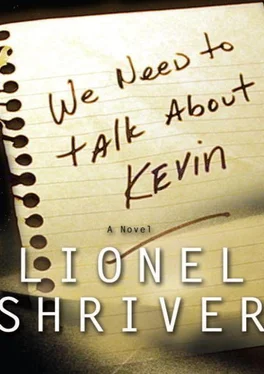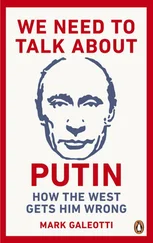After relating her terrible tale in a breathless stage whisper, she clearly expected me to leap to cover the cost of the tea set. Financially of course I could afford to, whatever it was worth, but I could not afford the attendant assumption of total blame. Face it, Franklin, you’d have had a fit. You were touchy about your son’s being singled out, or as you would say, persecuted . Technically he had only broken the one setting, and covering one-twelfth of the loss was the most compensation you would countenance. I also offered to speak to Kevin about “respecting the property of others,” though Miss Fabricant was underwhelmed by this assurance. Maybe she intuited that these set lectures of mine had begun to lilt with the swinging, mocking cadence of the one-potato, two-potato rhymes to which girls skip rope.
“That wasn’t very nice, Kevin,” I said in the car. “Breaking Muffet’s teacup.” I’ve no idea why we parents persist in believing that our kids yearn to be thought of as nice , since when we ourselves commend acquaintances as very nice we usually mean they’re dull.
“She has a stupid name.”
“That doesn’t mean she deserves—”
“It slipped,” he said lamely.
“That’s not what Miss Fabricant said.”
“How would she know.” He yawned.
“How would you feel, kiddo, if you had something that you cared about more than anything, and you brought it to show to the class, and then someone smashed it?”
“Like what?” he asked, innocence tinged with self-congratulation.
I reached casually in my head for an example of a possession that Kevin especially cherished, and it wasn’t there. Searching harder, I felt the same rising dismay of patting down all my pockets after discovering that the one in which I always kept my wallet was empty. It was unnatural. In my own rather underfurnished childhood, I was a fetishistic custodian of the lowliest keepsake, from a three-legged windup donkey named Cloppity to a rinsed-out four-pack of food-coloring bottles.
It’s not as if Kevin didn’t have things in abundance, since you showered him with toys. I’d feel unkind in pointing out that he ignored these Junior Game Boys and Tonka dump trucks across the board, save that your very excess seemed to signal an awareness that none of your previous gifts had taken. Maybe your generosity backfired, by lining his playroom in what must have seemed a kind of plastic dirt; and maybe he could tell that commercial presents were easy for us, being rich, and so, however expensive, cheap.
But I had spent weeks at a time crafting homespun, personalized playthings that should hypothetically have meant something . I made sure Kevin watched me, too, so that he knew them for labors of love. The most curiosity he ever exhibited was to ask irritably why I didn’t just buy a storybook. Otherwise, once my hand-drawn children’s book was sandwiched between painted pressboard covers, drilled and hole-punched and bound with bright yarn, he looked vacantly out the window as I read it aloud. I admit that the story line was hackneyed, about a little boy who loses his beloved dog, Snippy, and becomes distraught and looks everywhere and of course in the end Snippy shows up—I probably borrowed it from Lassie. I’ve never pretended to be a gifted creative writer, and the watercolors bled; I was suffering from the delusion that it’s the thought that counts. But no matter how many references to the little boy’s dark hair and deep brown eyes I planted, I couldn’t get him to identify with the boy in the story who pines for his lost puppy. (Remember when you wanted to buy Kevin a dog? I begged you not to. I was glad you never forced me to explain, since I never explained it to myself. I just know that whenever I envisioned our bouncing black lab, or trusting Irish setter, I was filled with horror.) The only interest he displayed in the book was when I left him alone with it to get dinner, only to find that he’d scribbled Magic Marker on every page—an early interactive edition , it seems. Later he drowned the stuffed-sock, button-eyed Teddy, aptly as it happens, in Bear Lake; he fed several pieces of my black-and-white wooden jigsaw of a zebra down the driveway’s drain.
I clutched at ancient history. “Remember your squirt gun?”
He shrugged.
“Remember when Mommer lost her temper, and stamped on it, and it broke?” I had got into the queer habit of referring to myself in the third person; I may have already begun to dissociate, and “Mommer” was now my virtuous alter ego, a pleasingly plump maternal icon with floury hands and a fire surging in a pot-bellied stove who solved disputes between neighborhood urchins with spellbinding fables and hot Toll House cookies. Meantime, Kevin had dropped Mommer altogether, thereby demoting the neologism to my own rather silly name for myself. In the car, I was disquieted to realize that he had ceased to call me anything at all. That seemed impossible, but your children generally use your name when they want something, if only attention, and Kevin was loath to beseech me for so much as a turned head. “You didn’t like that, did you?”
“I didn’t care,” said Kevin.
My hands slithered down the wheel from ten-and-two to a desultory seven-and-five. His memory was accurate. Since according to you in defacing my maps he had only been trying to help , you replaced the squirt gun, which he tossed into his slag heap of a toy box and never touched. The squirt gun had served its purpose. Indeed, I’d had a spooky presentiment when I finished grinding the barrel into the floor that since he had been attached to it, he was glad to see it go.
When I told you about the tea set, you were about to brush it off, but I shot you a warning glance; we had talked about the need for presenting a united front. “Hey, Kev,” you said lightly. “I know teacups are for girls and sort of prissy, but don’t break ’em, okay? It’s uncool . Now how about some Frisbee? We’ve just got time to work on that bank shot of yours before dinner.”
“Sure, Dad!” I remember watching Kevin streak off to the closet to fetch the Frisbee and puzzling. Hands fisted, elbows flying, he looked for all the world like a regular, rambunctious kid, exhilarated at playing in the yard with his father. Except that it was too much like a regular kid; almost studied. Even that Sure, Dad! had a rehearsed, nyeh-nyeh ring to it that I couldn’t put my finger on. I had the same queasy feeling on weekends when Kevin would pipe up—yes, pipe up —“Gosh, Dad, it’s Saturday! Can we go see another battlefield ?” You’d be so enchanted that I couldn’t bring myself to raise the possibility that he was pulling your leg. Likewise, I watched out the dining room window and could not believe, somehow, that Kevin was quite that inept at throwing a Frisbee after all this time. He still tossed the disc on its side, hooking the rim on his middle finger, and curled it ten yards from your feet. You were patient, but I worried that your very patience tempted Kevin to try it.
Oh, I don’t remember all the incidents that year aside from the fact that there were several, which you tagged with the umbrella dismissal, “Eva, every boy pulls a few pigtails.” I spared you a number of accounts, because for me to report any of our son’s misbehavior seemed like telling on him . I ended up reflecting badly not on him but on myself. If I were his sister I could see it, but could a mother be a tattletale? Apparently.
However, the sight I beheld in—I think it was March, well, I’m not sure why it unnerved me quite so much, but I couldn’t keep it to myself. I had gone to pick up Kevin at the usual time, and no one seemed to know where he was. Miss Fabricant’s expression grew pinched, though by this point, were Kevin abducted by the murderous pedophiles we were then led to believe lurked behind every bush, I’d suspect her of having hired them. The missing child being our son, it took a while before one of us thought to check the bathrooms, hardly his bolt-hole of choice.
Читать дальше












